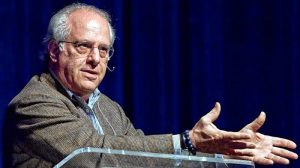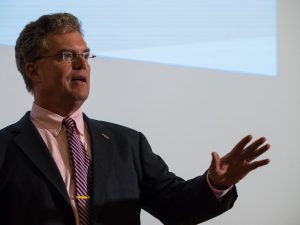Is Capitalism Worth Saving?
An Alexander Hamilton Forum Dialogue
Thursday, February 28, 2019 • 4:30 PM • Dana Auditorium
A leading socialist economist and a leading free-market economist/political scientist will address a crucial question in American public life: Is capitalism worth saving?
 “NO” – Richard Wolff has been called “America’s most prominent Marxist economist” by the New York Times Magazine. Professor Emeritus at UMass-Amherst and Visiting Professor at the New School University in New York, he is author over fifty scholarly articles and ten books, including Capitalism Hits the Fan: The Global Economic Meltdown and What to Do About It (2009), Capitalism’s Crisis Deepens: Essays on the Global Economic Meltdown (2016), and Democracy at Work: A Cure for Capitalism (2012), and Occupy the Economy: Challenging Capitalism (2012). Wolff hosts a weekly hour-long radio program, Economic Update, and is featured regularly in print and television media, including PBS, Fox Business, and HBO. He earned a PhD in economics from Yale University.
“NO” – Richard Wolff has been called “America’s most prominent Marxist economist” by the New York Times Magazine. Professor Emeritus at UMass-Amherst and Visiting Professor at the New School University in New York, he is author over fifty scholarly articles and ten books, including Capitalism Hits the Fan: The Global Economic Meltdown and What to Do About It (2009), Capitalism’s Crisis Deepens: Essays on the Global Economic Meltdown (2016), and Democracy at Work: A Cure for Capitalism (2012), and Occupy the Economy: Challenging Capitalism (2012). Wolff hosts a weekly hour-long radio program, Economic Update, and is featured regularly in print and television media, including PBS, Fox Business, and HBO. He earned a PhD in economics from Yale University.
 “YES” – Michael Munger is Professor of Political Science, Economics, and Public Policy at Duke University. One of the country’s leading libertarian social scientists, his primary research focus is on the functioning of markets, regulation, and government institutions. He is author of over fifty journal articles and author or editor of ten books, including Tomorrow 3.0: Transaction Costs and the Sharing Economy (2018) and Is Egalitarianism Fair? (forthcoming, 2019). He served 10 years as chair of the Duke Political Science Department and is the past President of the Public Choice Society. Before entering the academy, he worked as a staff economist at the Federal Trade Commission during the Reagan Administration. In 2008, Munger ran for Governor of North Carolina on the Libertarian ticket. He earned a PhD in economics from Washington University.
“YES” – Michael Munger is Professor of Political Science, Economics, and Public Policy at Duke University. One of the country’s leading libertarian social scientists, his primary research focus is on the functioning of markets, regulation, and government institutions. He is author of over fifty journal articles and author or editor of ten books, including Tomorrow 3.0: Transaction Costs and the Sharing Economy (2018) and Is Egalitarianism Fair? (forthcoming, 2019). He served 10 years as chair of the Duke Political Science Department and is the past President of the Public Choice Society. Before entering the academy, he worked as a staff economist at the Federal Trade Commission during the Reagan Administration. In 2008, Munger ran for Governor of North Carolina on the Libertarian ticket. He earned a PhD in economics from Washington University.
Refreshments will be served.
Sponsored by the Alexander Hamilton Forum, the Department of Political Science, the Department of Economics, and the Institute for Humane Studies

